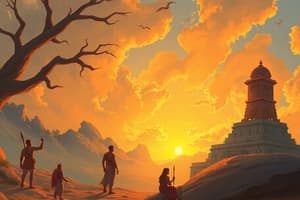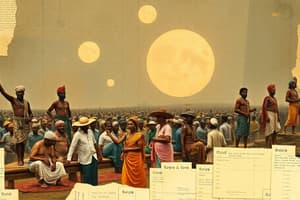Podcast
Questions and Answers
Which economic activity became central to wealth in the Early Vedic Age?
Which economic activity became central to wealth in the Early Vedic Age?
- Merchandising of goods
- Craftsmanship
- Cattle rearing (correct)
- Agriculture of staple crops
What significant literary texts were composed during the Later Vedic Age?
What significant literary texts were composed during the Later Vedic Age?
- The Upanishads, the Mahabharata, and the Ramayana (correct)
- The Aranyakas, the Yoga Sutras, and the Manusmriti
- The Rigveda, the Samaveda, and the Brahmanas
- The Puranas, the Vedas, and the Sutras
What was the primary belief system during the Early Vedic Age?
What was the primary belief system during the Early Vedic Age?
- Atheism with no belief in deities
- Monotheism centered on a single supreme deity
- Animism focused on spirits of the earth
- Polytheism centered on nature deities (correct)
Which development marked the economic transition during the Later Vedic Age?
Which development marked the economic transition during the Later Vedic Age?
What role did the caste system play during the Later Vedic Age?
What role did the caste system play during the Later Vedic Age?
Flashcards are hidden until you start studying
Study Notes
Early Vedic Age
Religious Practices
- Polytheism prevalent, worshiping nature deities such as Indra (god of rain), Agni (fire god), and Varuna (cosmic order).
- Rituals, known as yajnas, were performed by Brahmin priests to maintain cosmic order (Rta).
- Hymns compiled in Samhitas and mantras played a crucial role in ritualistic worship.
Economic Activities
- The society was largely pastoral and agrarian, with a significant focus on cattle rearing as a source of wealth and status.
- Agriculture was limited, with seasonal crops cultivated using early farming techniques.
- Economic exchanges relied on barter systems, with some trade connections to neighboring regions.
Literary Contributions
- Formation of the four Vedas: Rigveda, Samaveda, Yajurveda, Atharvaveda, encapsulating hymns and philosophical queries.
- Rigveda, the oldest Veda, is rich in poetic forms and serves as a foundational scripture.
- Emphasis on oral traditions for knowledge transmission, highlighting the importance of memorization and recitation.
Later Vedic Age
Religious Practices
- Increased complexity in rituals and ceremonies, reflecting a shift in spiritual practices.
- The Upanishads emerged as significant philosophical texts, delving into metaphysics and spirituality.
- Introduction of the concept of Brahman, representing the universal soul, alongside the rise of new deities and ascetic traditions aimed at achieving moksha (liberation).
Economic Activities
- Advancements in agriculture due to the introduction of iron tools, boosting productivity and crop yields.
- Urban centers developed, with expanded trade routes facilitating commerce and economic growth.
- Craftsmanship flourished, leading to the formation of guilds for artisans and traders, establishing a more structured economy.
- The caste system began to strengthen, affecting economic roles and the division of labor based on social hierarchy.
Literary Contributions
- The Upanishads focused on philosophical discourse and spiritual teachings, marking a significant literary advancement.
- Brahmanas and Aranyakas arose to explain various rituals and ceremonies associated with Vedic traditions.
- Epic narratives, notably the Mahabharata and Ramayana, emerged, offering historical and moral lessons.
- Sanskrit remained the primary language, evolving to include prose along with poetry, enriching the literary landscape.
Studying That Suits You
Use AI to generate personalized quizzes and flashcards to suit your learning preferences.




